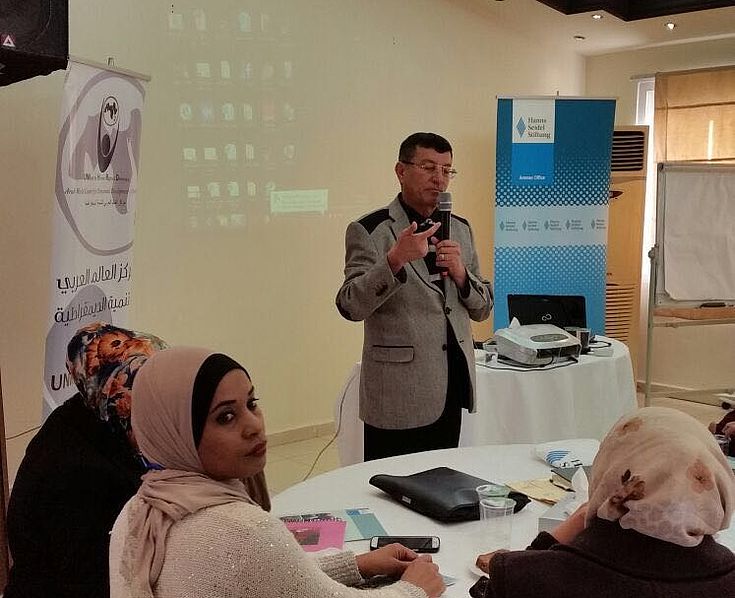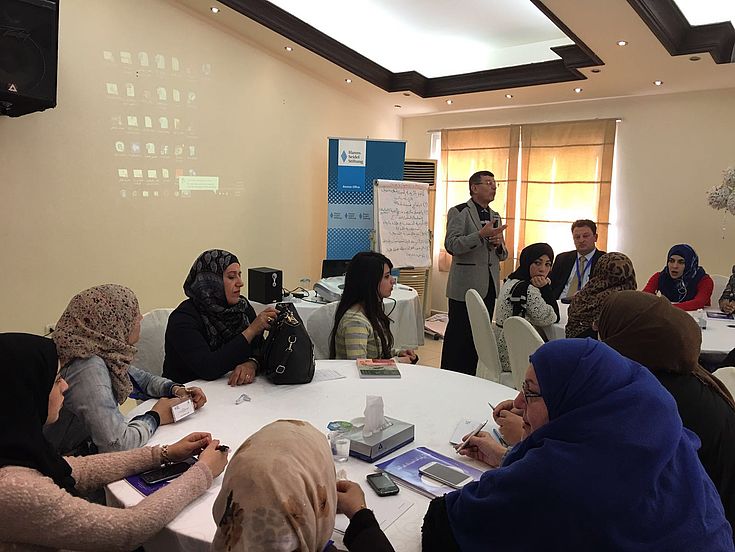What's happening at HSS?
Workshop on 'Social Transformation and Migration in Jordan', February 14 - 16, 2016 in Irbid / Jordan
Lecturer Dr. Mahmoud Al-Sarhan
The Syrian refugee influx into Jordan has been massive. As of February 2016, more than 630,000 Syrians were registered with the United Nations Refugee Agency in Jordan, Eighty-four percent of these Syrians live in host communities as opposed to refugee camps. Syrian refugees have stressed economic and resource infrastructure in Jordan, which was already suffering from structural issues before the refugee crisis. According to the latest population census conducted late last year, 1.26 million of Jordan's population are Syrians.
The negative public sentiment toward Syrians constrains the Jordanian government in its ability to respond to the refugee crisis. As host-community tensions rise, Jordanian citizens have called upon the government to limit competition from Syrian refugees. Since 2014, the Jordanian government has responded to increasingly vocal public frustration and growing regional security risks by narrowing its hospitality toward Syrian refugees. Jordan has restricted the number of Syrians who can enter the country, closed accessible border crossings, and attempted to confine more refugees to camps.
The Hanns-Seidel-Stiftung in cooperation with the 'Arab World Center for Democratic Development - UniHRD' carried out a workshop to discuss 'Jordan's many challenges' with representatives from various ministries, NGOs, local authorities, journalists, students and members of the Syrian community.
The workshop aimed to look at the enormous strides Jordan has made in healthcare, literacy, and democratic and economic reform as well as the challenges it faces from a lack of natural resources, environmental concerns, and economic and social issues.
The participants considered the impact of Palestinian, Iraqi, and Syrian immigrants and refugees, who now make up more than two-thirds of the nation’s population. They assessed the implications of the large influx of Syrian refugees to Jordan on the country’s labour market, primarily by identifying current trends and future threats that can be attributed to the influx of Syrian refugees as well as its impact on the modernization on Jordan’s culture and society.
The Jordanian public consistently overstates the negative impacts of the Syrian refugee influx, while the positive impacts receive far less attention, highlighting the politicized nature of the refugee crisis in Jordan. Public sentiment toward Syrian refugees has a deleterious effect on the government’s ability to respond productively to the refugee influx.
But, however, and the participants agreed on, to respond to the challenges it requires the support of the international community. Jordan and international donors should act on the opportunities inherent in the Syrian refugee influx into the kingdom, to both enhance Jordan’s national development and provide for Syrians displaced by the most devastating civil war of the last decade. For example creating jobs for Syrian refugees can only be in a manner that is not at the expense of the Jordanians.
Confronted with persistently underfunded humanitarian appeals, Jordan has lost confidence in international donor support. Without additional aid and a sustainable response to the refugee crisis, Jordan will continue to restrict the protection space for Syrians. Doing so will increase the long-term risks of instability in Jordan and the region and increase the refugee movements towards Europe.
The workshop has provided a platform not only to talk about Syrian refugees, but to involve them in the discussion. Both sides need to know the conditions and the mutual expectations to be able to make their contribution to the development and social transformation of Jordan.


